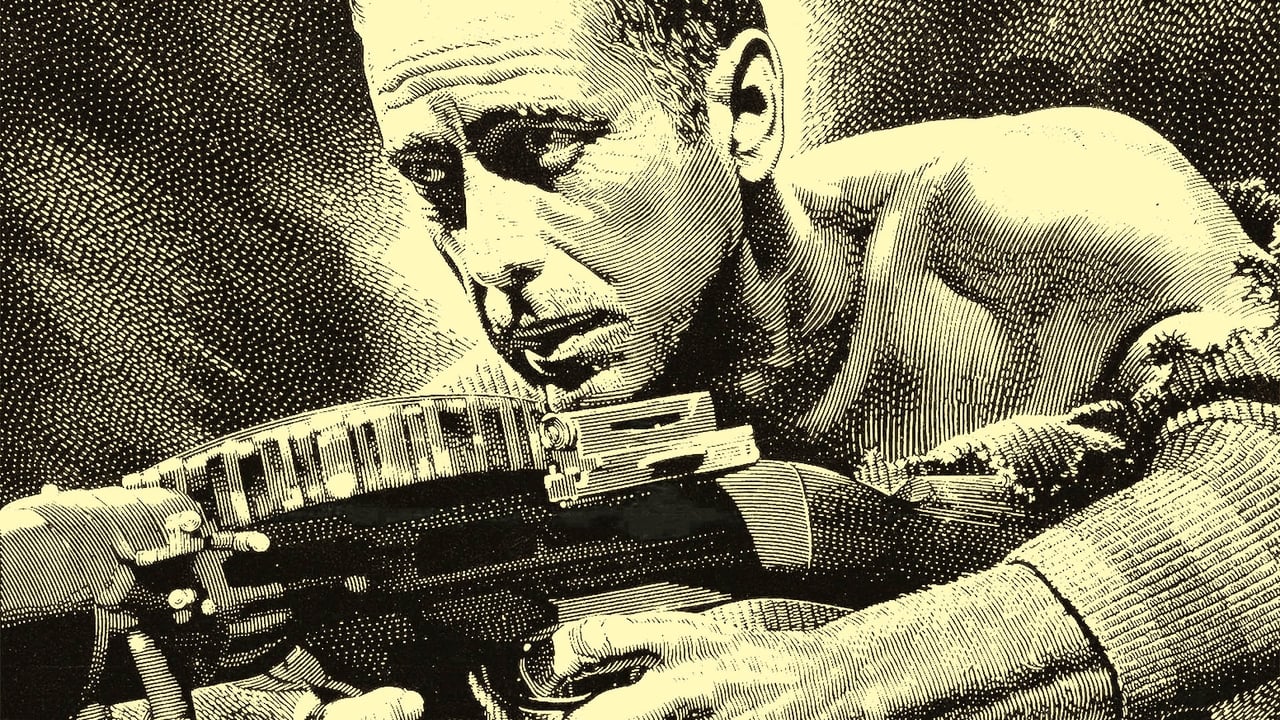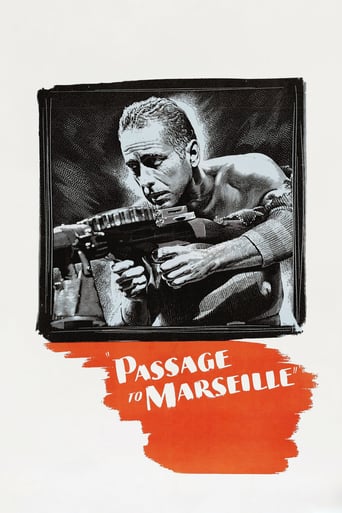

Copyright 11 March 1944 by Warner Bros. Pictures, Inc. A Hal B. Wallis production. A Warner Bros.-First National picture. U.S. release: 17 February 1944. New York opening at the Hollywood: 16 February 1944. Australian release: 3 May 1945. 109 minutes.SYNOPSIS: Convicts escape from Devil's Island to join the Free French forces. (Warner DVD rates 10 out of ten).COMMENT: This is the film that is determined to go backwards, what with its flashback within a flashback within a flashback, plus its war- time propaganda and its violent anti-German and anti-Vichy French sentiments. Bogart happily guns down the German survivors of the downed plane, while the villain played by Sydney Greenstreet is a type of the capitulating and corroborating Petain. Unfortunately, all these war-time elements make the film rather dated and less interesting today. This attempt to recapture the appeal of "Casablanca" by reuniting the players, director and script reviser is unfortunately not a great success.John Loder has the thankless part of the feeding-instant- information-to-the-audience reporter, but the other players help pull the film out of the rut. Bogart doesn't bother with a French accent, but presumably he took his cue from my favorite French actress, Michele Morgan, whose English bears not the slightest trace of an accent either; while Rains of course is his usual personable self (a little too suave perhaps for what is really a straight part — he wears his cap at his customary jaunty and rakish angle and does his best to invest interest in the character despite his poorly written and shallow role).Truth to tell, Michele Morgan does not have much of a part either, but thanks to Wong Howe's lighting, she invests it with her usual luminosity. Greenstreet is Greenstreet. Tobias tries an accent to match Dorn. Lorre seems suitably, if conventionally cast but nothing alas is made of the character; he is killed off before he does anything. Now if he had been handed the Hans Conried role... Other points to note: Superb cutting, for example the plane dive-bombing seen through the reaction of Billy Roy's mess boy; great use of noirish shadows in the photography; Curtiz's usual skilled compositions and mise en scene; powerful Weyl sets especially on Devil's Island; the classic Steiner score (despite its overly patriotic tub-thumping). The stark realism espoused by Howe and Curtiz comes through in the ship-board scenes (the explosions and dangerous special effects right up close to the players provide really thrilling all-stops-out action).But despite all its good points, the film is a disappointment for which the talky, hokey, jingoistic and unbelievable script is chiefly to blame.
... View More. . . as all the Frenchmen except Sydney Greenstreet's Major Duval character seem hellbent on killing every Nazi or Hitler sympathizer they can get in their machine gun sights during PASSAGE TO MARSEILLE. (If Fox News were around in 1944, I'm sure they would deride this flick for NOT being fair and balanced, no doubt labeling it a ploy of the liberal media and pinko Hollywood designed to win support for Russians and other enemies of capitalism.) While it is true that the one thing Nazi forces do in MARSEILLE that gets under everyone's skin is strafing the freighter full of nickel ore that Humphrey Bogart's Jean Matrac character and his comrades are defending (resulting in Bogie machine gunning the surrendering plane crew minutes AFTER he's brought down their aircraft), the Nazi approach here seems counter-productive. Major Duval and his ship's radio officer henchman had informed the German high command that the freighter carried raw materials vital to the Nazi war effort, so why in the heck would they try to sink this ship?
... View MoreSee it – This is more of an adventure movie, but it takes place during WWII, so we'll call it a war movie. The story is told in a flashback, and flashbacks within the flashback. Humphrey Bogart stars as a patriotic French convict who escapes from his island prison and journeys thousands of miles to help his country fight in the war. Adventures take place over land, air, and sea. The scene where Bogart is furiously firing his machine gun from the ship deck railing at attacking German aircraft is one the most iconic moments in early Hollywood history. I love watching WWII movies that were made while the actual war was still going on. This inspirational classic is heroic and tragic, yet full of hope. 2.5 action rating.
... View MorePassage to Marseille (1944) *** (out of 4) Big-budget Warner war film about a group of Devil's Island escapees who join up with the French to battle Germans. I had held off on watching this film for many years expecting your typical WWII drama but that's certainly not what I got as the movie is quite different from other movies and in the end it comes off quite fresh and original. The movie is pretty much told via one flashback after another as we jump around in the story but this never get confusing as the screenplay perfectly builds off everything that happened earlier in the movie. We have Humphrey Bogart and Peter Lorre playing two of the escaped convicts and getting to know their backstory just added to everything that would follow when it came time to escape and then when it came time to fight. The film has an all-star cast that not only has Bogart and Lorre but we also get Claude Rains, Sydney Greenstreet, George Tobias, Philip Dorn, Michele Morgan, John Loder and several other familiar character actors from the studio. The performances by the entire cast are very good but the film clearly belongs to Bogart who once again proves he was one of the all-time great tough guys. Only Bogart could pull off a role like this because he makes you understand why he hates his country yet, at the same time, you can tell that deep down he's going to have courage and be ready to fight when that time comes. Towards the end of the film when everyone is on a boat, which is about to be taken over by the Germans, a great battle follows and this entire sequence contains one great action piece after another and in the middle of it all is Bogart and you believe everything he does. The rest of the cast are all good and add a lot of entertainment to the film as one would expect from such veterans. Curtiz once again shows why he's one of the most underrated director's in the history of this era as he not only handles the action sequences but he also does a marvelous job with the quieter moments and he's perfectly capable of letting the drama build up over time. Many people have called this CASABLANCA-light as this film has pretty much all of the same talent behind it but it's really unfair to compare the two films as they are quite different on all levels. This film here certainly isn't a masterpiece but this is still a very solid action film that deserves a better reputation than it has.
... View More